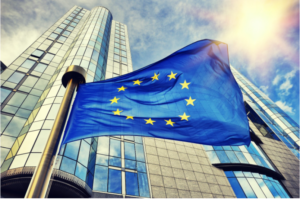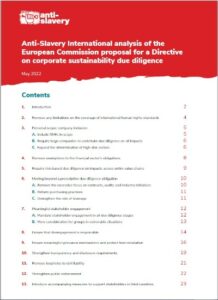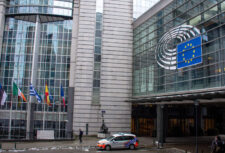In February 2022, we shared our initial reaction to the EU Commissions’ proposal for a mandatory human rights and environmental due diligence law. We have now released our comprehensive analysis and recommendations for addressing the proposal’s shortcomings. Rocio Domingo-Ramos, Business and Human Rights Policy and Research Officer, shares how we believe the proposal can be even stronger.

Following the long-awaited publication of the European Commission’s proposal for mandatory human rights and environmental due diligence legislation, in February 2022 we shared our initial reactions regarding the proposal’s effectiveness. After a thorough internal analysis of the Directive’s content, as well as external consultations, we are now releasing a comprehensive analysis of the proposal for a directive on due diligence, with specific recommendations for the European Parliament and the European Council to strengthen it.
We welcomed the publication of the Commission’s proposal and the many positive elements Anti-Slavery International and our partners have been tirelessly advocating for over the past few years. This includes, for example, the proposal’s coverage of companies’ entire value chain, addressing businesses’ responsibilities not only towards their direct suppliers, but also the impacts of their wider business relationships.
Despite some of these positive elements, current loopholes are limiting the upcoming law’s potential impact on the lives of workers and communities around the world. In order to achieve real change on the ground and meaningfully compel companies to address their forced labour risks, these are some of the areas the EU should focus on strengthening:
- Make sure the directive provides a non-exhaustive list of human rights standards, including on forced labour, for companies to respect.
- Given the current thresholds, the Commission estimates that only 17,000 companies will be covered by the legislation:
- The exclusion of small and medium sized enterprises (SMEs) could therefore be detrimental to sectors such as fashion, where 99.8% of EU textile companies wouldn’t even have to comply with the law as they fall outside of this. The directive must therefore be amended by bringing the inclusion of SMEs under its scope;
- The proposal is only recognising a limited number of sectors deemed as high risk in terms of their human rights and environmental impacts. The directive must recognise high risk industries where forced labour is highly prevalent, such as in the manufacturing of electronics, construction and hospitality.
- Responsibilities for the financial sector are currently limited to only very large institutions and only at a pre-contractual stage. Given their potential to exert positive influence over creditors, as well as the dynamic nature of forced labour which can change throughout the investment cycle, all these limitations on the financial sector should be removed.
- The due diligence requirements across the value chain should not be limited to only ‘established’ business relationships, an element which could unintentionally promote short-term and insecure contracts for workers, as opposed to long-term and healthy relationships with suppliers. Contractual clauses industry initiatives and third-party verification should not be used as means to evade liability in those cases where companies have not met their due diligence requirements.
- Meaningful and credible engagement with affected and potentially affected workers and other stakeholders has always been one of our key asks. We are concerned to see the proposal’s weaknesses around this area:
- The directive must strengthen its requirements around stakeholder engagement throughout the entire due diligence process;
- It should also pay special attention to gender-specific needs and other groups in vulnerable situations such as children, marginalised communities and minorities, homeworkers and migrant workers.
We analyse these elements and other key loopholes in our full analysis and make specific recommendations for the EU to amend the proposal. We will continue working to make sure the voices of our global partners working directly with those most affected by corporate harms are brought into the design of the law. We will carry on putting pressure on EU institutions to ensure policy responds to realities on the ground, and we will not let the EU miss the opportunity to drive companies’ respect for people and the planet.
Keep an eye on our website and social media to find out how you can get involved and together let’s make a difference to the planet and lives of people around the globe.
Read our comprehensive analysis:
Download a copy of the full analysis here.
Find out more about our work in the EU here.






